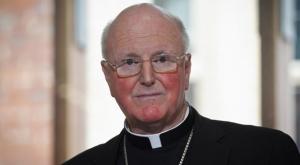 In his book A Secular Age Charles Taylor shows how secularity in his definition: “consists of new conditions of belief; it consists in a new shape to the experience which prompts to and is defined by belief; in a new context in which all search and questioning about the moral and spiritual must proceed. . . . .The main feature of this new context is that it puts an end to the naive acknowledgment of the transcendent, or of goals or claims which go beyond human flourishing.” (Kindle Edition loc. 364)
In his book A Secular Age Charles Taylor shows how secularity in his definition: “consists of new conditions of belief; it consists in a new shape to the experience which prompts to and is defined by belief; in a new context in which all search and questioning about the moral and spiritual must proceed. . . . .The main feature of this new context is that it puts an end to the naive acknowledgment of the transcendent, or of goals or claims which go beyond human flourishing.” (Kindle Edition loc. 364)
One result of this new kind of secularity is what Taylor describes as heroic atheism. It is heroic, as he notes, exactly because it is chosen and not fully proven by science. “Faith has to remain a possibility, or else the self-valorizing understanding of atheism founders.” (Kindle Edition loc. 9401)
Three recent works help us to understand more fully the new conditions of disbelief under which the atheist must labor with essentially the same problem as the theist caught up in a secular age: the knowledge that one’s essential orientation within reality is chosen and can thus change.
Richard Beck’s book, The Authenticity of Faith, examines the arguments from psychology, particularly those of Freud, that assert that faith in God is in fact “a projection of self-seeking emotions, an objectification of subjective needs, the self in disguise” (to quote Heschel.) Beck’s argument is that while psychological explanations serve in some, or even many cases of faith, psychologists themselves must acknowledge instances of faith that do not fit their models. And these instances cast serious doubt on the decisiveness of psychological claims that faith is inauthentic.
Alvin Plantinga, in multiple works but notably Warranted Christian Belief (whose arguments are presented more accessibly in Knowledge and Christian Belief), demonstrates that belief in God satisfies the conditions of rationality and warrant. He takes on not only Freud, but Marx and other modern critics to show through careful philosophical analysis that believing in God, indeed believing in God in specifically Christian ways, both makes sense and can be sensibly expressed in theological form. Notably, like Beck, he doesn’t claim to prove the existence of God as understood by Christians. But unlike Beck he asserts his Christian belief is more probable than not.
Probability is at the center of Robert Spitzer’s New Proofs for the Existence of God. If Plantinga was conscious that his arguments were excessively technical he need not fear. Spitzer spends the first half of his book in an in-depth examination of the mathematics of current cosmological theories. His conclusion, backed by numerous references in which cosmologists critique one another, is that the universe has a definite beginning, which thus demands a transcendent cause. And further, that the conditions for life to appear in the universe are so finely tuned as to suggest that lack of a transcendent cause is astronomically improbable.
What emerges from these works, which are exemplary rather than exhaustive, are the new conditions of dis-belief emerging as modernity moves beyond its initial creation of secularity. These new conditions can be briefly described as the emergence within the social sciences, physical sciences, and philosophy of voices interrogating the theoretical frameworks supporting atheism. Just as theism in the pre-modern world became a default no longer available in a secular age, so atheism is no longer a default in the contemporary world for those who claim allegiance to science and rationality.
Or in other words, we are all living by faith. More precisely the inclusion or exclusion of a transcendent creator in the framework within which we interpret (in self-concept and action) what it means to be human in society is a choice, not a deviation (one way or another) from a self-justifying norm. For this reason we should regard atheism as a religion in the classic anthropological sense, now cast into the realm of late modernity. And thus, for theists, atheism is a religion that needs to be engaged in respectful rather than dismissive dialogue. This is a thought I’ll continue in the next blog.











